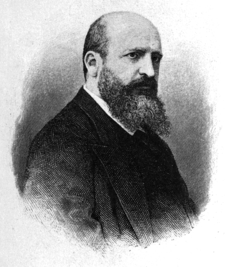Pedro Antonio de Alarcón
Pedro Antonio de Alarcón y Ariza (10 March 1833 – 19 July 1891) was a nineteenth-century Spanish novelist, best known for his novel El sombrero de tres picos (1874), an adaptation of a popular traditions which provides a lively picture of village life in Alarcón's native region of Andalusia. It was the basis for Hugo Wolf's opera Der Corregidor (1897) and Manuel de Falla's ballet The Three-Cornered Hat (1919).
Pedro Antonio de Alarcón | |
|---|---|
 Portrait published 1898 | |
| Born | Pedro Antonio de Alarcón y Ariza March 10, 1833 Guadix, Granada, Spain |
| Died | July 19, 1891 (aged 58) Madrid, Spain |
| Occupation | Novelist |
| Language | Spanish |
| Nationality | Spanish |
| Literary movement | Literary realism |
Alarcón wrote another popular short novel, El capitán Veneno ('Captain Poison', 1881). He produced four other full-length novels. One of these novels, El escándalo ('The Scandal', 1875), became noted for its keen psychological insights. Alarcón also wrote three travel books and many short stories and essays.
Alarcón was born in Guadix, near Granada. In 1859, he served in a Spanish military operation in Morocco. He gained his first literary recognition with Diary of a Witness to the African War (1859–1860), a patriotic account of the campaign.
Works
- Cuentos amatorios.
- El final de Norma: novela (1855).
- Descubrimiento y paso del cabo de Buena Esperanza (1857).
- Diario de un testigo de la Guerra de África (1859).
- De Madrid a Nápoles (1860).
- Dos ángeles caídos y otros escritos olvidados.
- El amigo de la muerte: cuento fantástico (1852).
- El año en Spitzberg.
- El capitán Veneno: novela.
- El clavo.
- El coro de Angeles (1858).
- La Alpujarra (1873)
- El sombrero de tres picos: novela corta (1874).
- El escándalo (1875)
- El extranjero.
- El niño de la Bola (1880).
- Historietas nacionales.
- Juicios literarios y artísticos.
- La Alpujarra: sesenta leguas a caballo precedidas de seis en diligencia.
- La Comendadora.
- La mujer alta: cuento de miedo.
- La pródiga
- Lo que se oye desde una silla del Prado.
- Los ojos negros.
- Los seis velos.
- Moros y cristianos.
- Narraciones inverosímiles.
- Obras literarias de Pedro Antonio de Alarcón. Volumen 2
- Obras literarias de Pedro Antonio de Alarcón. Volumen 1
- Obras literarias de Pedro Antonio de Alarcón. Volumen 3
- Poesías serias y humorísticas
- Soy, tengo y quiero.
- Viajes por España.
- Últimos escritos.
References
- World Book encyclopedia 1988
External links
| See also … |
|---|
| Works at Cervantes Virtual |
- Works by Pedro Antonio de Alarcón at Project Gutenberg
- Works by or about Pedro Antonio de Alarcón at Internet Archive
- Works by Pedro Antonio de Alarcón at LibriVox (public domain audiobooks)

- Las Dos Glorias in Spanish with English translation
- Pedro Antonio de Alarcón at Library of Congress Authorities, with 186 catalogue records